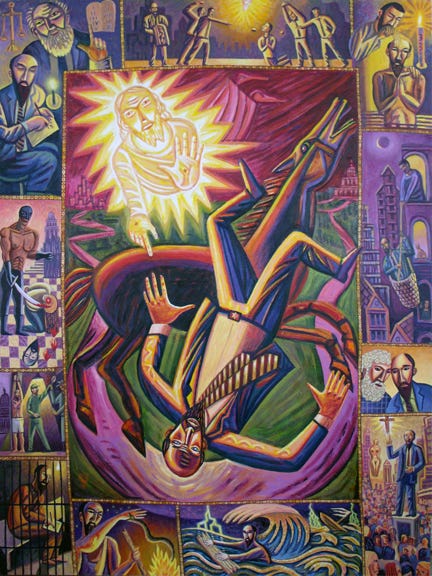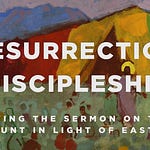A few years ago, my friend Tony came to the church I was working to be our “Scholar in Residence.” While Tony was in town, he taught a few seminars and preached on Sunday morning. He traveled with his wife and children. When Tony did not have responsibilities at the church, he took his family sightseeing. They visited all the sites we who live close to the DC avoid during the summer months.
The Washington Monument.
The Lincoln Memorial.
A few of the Smithsonian museums.
Mount Vernon.
After seeing the sights and eating at all places you are supposed to eat at when you visit DC, Tony preached on Sunday morning. He mentioned how each sight he visited painted its subject in the most flattering light, more positive than history books may portray the subject. Tony’s visit to DC was in 2011, well before sights like Mount Vernon began to address the harm done at the hands of the celebrated saints of our nation.
In the stories told at each historical site, Tony said it seemed that only part of the story was being told. And the part being told was not an entirely accurate portrayal.
For ten chapters, Paul has been going on and on about the grace, judgment, and salvation of God. Ten chapters about humanity’s deserving of divine judgment. Ten chapters of humanity receiving the grace of God instead of what we deserve, all because of who God is and not because of who we are in the stories we tell ourselves.
“What about our family, our fellow Jews,” someone asks Paul.
“What about the Gentiles!? They are not part of our covenant with the Lord,” asked another.
What about them?
Paul asks, “has God rejected God's people?”[i] “No,” says Paul. God did not reject Paul after Paul persecuted the Church. On the Road to Damascus Paul received grace, not judgment.
The grace of God is more amazing than we can imagine. Paul writes that God's grace finds room for even the Gentiles, for those who are outside of the Covenant established between God and Israel (which is good news for us). There is even room for those who have turned away from God. If God can save us, Paul writes, God can save anybody. Even when faced with disobedience, there is the occasion for grace through God.
Like Paul falling off his horse, when we realize the grandness of the grace of God, our theological socks can be knocked off. This does not have to be a mountaintop experience. Perhaps it was during a sermon, or while the choir was singing your favorite hymn, or maybe while you were praying before the sun rose. Paul realizes that the grandness of the grace of God is grander than he realized. God’s grace goes a step further.
To realize that God loves Jews and Gentiles, and is kind to the selfish and ungrateful can move us to shout for joy, which is how Paul concludes this chapter.
“O the depth of the riches and wisdom and knowledge of God! How unsearchable are his judgments and how inscrutable his ways!”[ii]
The grace of God is a constant throughout our holy scriptures and Christ’s ministry. Still, though, we sometimes attempt to paint Christ or even the grace of God in our image. We try to use grace as a prop in our stories rather than allowing God’s grace to stand at the center of who we are and everything we do.
Jesus asked his disciples, “Who do people say that the Son of Man is?”[iii] “Who do the people hearing me teach and watching my ministry say I am?” The disciples replied, “Some say John the Baptist, but others Elijah, and still others Jeremiah or one of the prophets.”[iv]
“Some say you are this or that, projecting their expectations upon God’s grace and, in turn, attempting to rewrite the story of grace through what they thought they knew. Christ must be this or that. A prophet. A teacher. A miracle worker.”
“So that you may not claim to be wiser than you are, brothers and sisters, I want you to understand this mystery,”[v] writes Paul.
God is bigger than the boundaries we build. The grace of God is more expansive and inclusive than the stories we tell ourselves. If left to us, we will define God based on what we know, or worse, on the story we are trying to tell rather than as God.
God chooses love above all else.
Love for Israel.
Love for Gentiles.
Love for sinners.
Love for saints.
Half of my family is from Appalachia, specifically Greenbriar County, West Virginia. When the book-turned-movie Hillbilly Elegy painted the entire region of Appalachia with stereotypes and generalizations, I was frustrated, to say the least. The story told by author-turned-politician JD Vance blurred the line between personal memoir and sociological analysis. While fascinating and entertaining, the story told by Vance lacked reliability in its conclusions because only one part of the story was being told. And yet, that story was used to paint an entire region with a broad brush.
In response to Vance’s book Elizabeth Catte wrote What You’re Getting Wrong About Appalachia. Catte makes the point that any region or group of people is not monolithic and that, in the case of Appalachia, it is not a backward or homogeneous place. Instead, it is a diverse region with a rich history and culture.
After the disciples responded to Jesus’ question of who others say he is, he asked, “But who do you say that I am?”[vi]
If asked today, who do we say Christ is? Some might say national a virtue, a source of strength or inspiration, a savior, grace dealer, or a teacher to keep kids in line.
Typical of us, right? Given the chance to talk about the grace of God, and one of our natural tendencies is to put Jesus in a box, and in doing so we begin to speculate about who is in and who is out. If following Christ means we are saved, if making Christ’s story our story, then there must be someone or a group on the outside, right? Yet, the grace of God tells us that we are not stories we attempt to create or about ourselves and that Christ does not fit into the box we want him to fit into.
Dietrich Bonhoeffer called the grace we bestow upon ourselves “cheap” because in bestowing this upon ourselves, we inevitably create God in our image. Instead, Bonhoeffer argues that grace is costly. “Costly grace,” he writes, “confronts us with a gracious call to follow Christ. It comes with a word of forgiveness to the broken spirit and contrite heart.”[vii]
God has made a covenant with Israel, and Paul argues that the gospel's Good News does not undo the grace present in God’s covenant with Israel. The Good News of Christ does not undo God’s faithfulness and steadfast love for Israel. And at the same time, God has saved all of creation through Christ and is making all of creation new. Both can be true.
God will not reject God’s own people any more than God has rejected the Gentiles. All shall be saved, and in all being saved, the story of salvation is lifted from our hands and placed back in God’s. Paul is telling the church in Rome and Arlington that they and we are going to have to allow God to be God, even if in doing so the story being told about them and us does not align with the story we have been told or have been telling.
The good news of the grace of God is God’s story to tell. We are the recipients. Unlike the stories we create about ourselves, the grace of God doesn’t paint us in a more flattering light. But (and it’s a big but so you know it does not lie)It exposes the messy, mixed-up truth of the matter and loves it anyway because while we might gloss over details of our lives or try to forget the things we are not proud of doing, through grace, God has taken those parts of our story head-on. Forgiving and sanctifying so that we become part of the story of God’s faithfulness across time and people.
[i] Romans 11:1
[ii] Romans 11:33, NRSV
[iii] Matthew 16:13, NRSV
[iv] Matthew 16:14, NRSV
[v] Romans 11:25, NRSV
[vi] Matthew 16:15, NRSV
[vii] Bonhoeffer, Dietrich. The Cost of Discipleship.





















Share this post